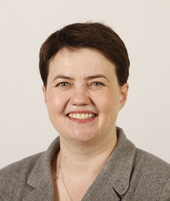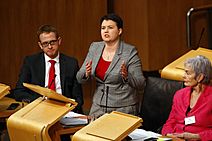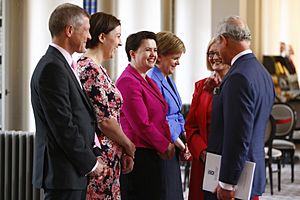Ruth Davidson facts for kids
Quick facts for kids
The Baroness Davidson
of Lundin Links |
|||||||||||||||||
|---|---|---|---|---|---|---|---|---|---|---|---|---|---|---|---|---|---|

Official portrait, 2016
|
|||||||||||||||||
| Leader of the Opposition in Scotland | |||||||||||||||||
| In office 11 August 2020 – 5 May 2021 |
|||||||||||||||||
| Monarch | Elizabeth II | ||||||||||||||||
| First Minister | Nicola Sturgeon | ||||||||||||||||
| Preceded by | Jackson Carlaw | ||||||||||||||||
| Succeeded by | Douglas Ross | ||||||||||||||||
| In office 6 May 2016 – 29 August 2019 |
|||||||||||||||||
| Monarch | Elizabeth II | ||||||||||||||||
| First Minister | Nicola Sturgeon | ||||||||||||||||
| Preceded by | Kezia Dugdale | ||||||||||||||||
| Succeeded by | Jackson Carlaw | ||||||||||||||||
| Leader of the Scottish Conservative Party | |||||||||||||||||
| In office 4 November 2011 – 29 August 2019 |
|||||||||||||||||
| Deputy |
|
||||||||||||||||
| UK party leader | |||||||||||||||||
| Preceded by | Annabel Goldie | ||||||||||||||||
| Succeeded by | Jackson Carlaw | ||||||||||||||||
| Member of the House of Lords | |||||||||||||||||
|
Lord Temporal
|
|||||||||||||||||
| Life peerage 20 July 2021 |
|||||||||||||||||
|
|||||||||||||||||
| Personal details | |||||||||||||||||
| Born |
Ruth Elizabeth Davidson
10 November 1978 Edinburgh, Scotland |
||||||||||||||||
| Political party | Scottish Conservatives | ||||||||||||||||
| Domestic partner | Jen Wilson | ||||||||||||||||
| Children | 1 | ||||||||||||||||
| Alma mater | |||||||||||||||||
| Military service | |||||||||||||||||
| Allegiance | United Kingdom | ||||||||||||||||
| Branch/service | Territorial Army | ||||||||||||||||
| Years of service | 2003–2006 | ||||||||||||||||
| Rank | Signaller | ||||||||||||||||
| Unit | 32 Signal Regiment | ||||||||||||||||
Ruth Elizabeth Davidson, Baroness Davidson of Lundin Links, is a Scottish politician. She is a member of the House of Lords, which is part of the UK Parliament. Before this, she was the Leader of the Scottish Conservative Party from 2011 to 2019.
Davidson was a Member of the Scottish Parliament (MSP) for ten years. She represented the Glasgow area from 2011 to 2016 and Edinburgh Central from 2016 to 2021. In 2021, she was made a life peer, which gave her the title "Baroness" and a seat in the House of Lords.
Before politics, Davidson worked as a journalist for the BBC and served in the Territorial Army. She joined the Conservative Party in 2009. After becoming party leader in 2011, she helped the Conservatives become the second-largest party in the Scottish Parliament in 2016.
Davidson supported Scotland remaining in the United Kingdom during the 2014 Scottish independence referendum. She also supported the UK remaining in the European Union in the 2016 EU referendum.
Contents
Early Life and Career
Ruth Davidson was born in Edinburgh, Scotland. She grew up first in Selkirk and later in Lundin Links, Fife. Her father was a mill manager who had played professional football for Partick Thistle F.C. when he was younger.
Davidson studied English literature at the University of Edinburgh. After graduating, she began a career in journalism. She worked as a reporter for a local newspaper and radio stations before joining BBC Scotland in 2002. At the BBC, she was a radio journalist, producer, and presenter.
In 2009, she left the BBC to study at the University of Glasgow. During this time, she also served for three years as a signaller in the Territorial Army, which is a reserve force for the British Army.
Start in Politics
Davidson joined the Conservative Party in 2009. She said she was inspired when David Cameron, who was then the leader of the party, asked people who weren't involved in politics to join.
She first worked as an assistant to the Scottish Conservative leader at the time, Annabel Goldie. In the 2011 Scottish Parliament election, Davidson was elected as a Member of the Scottish Parliament (MSP) for the Glasgow region. After being elected, she became the party's spokesperson for Culture and European issues.
Leader of the Scottish Conservatives
Becoming the Leader
After the 2011 election, Annabel Goldie stepped down as leader. Davidson decided to run in the election to replace her. She stood against three other candidates. On November 4, 2011, she won the election and became the new leader of the Scottish Conservative Party.
Leading the Party
As leader, Davidson worked to modernize the party. She supported more powers for the Scottish Parliament, a process known as devolution. She also supported same-sex marriage.
The 2014 Scottish independence referendum was a major event during her leadership. She campaigned for Scotland to vote 'No' and remain part of the United Kingdom. She believed that Scotland was stronger as part of the UK.
After the referendum, she continued to focus on keeping the Union together. She often debated with Nicola Sturgeon, the leader of the Scottish National Party (SNP).
Electoral Success in 2016 and 2017
Davidson's leadership saw the party achieve some of its best election results in years. In the 2016 Scottish Parliament election, the Scottish Conservatives won 31 seats, more than doubling their previous number. This made them the second-largest party in the Scottish Parliament, ahead of the Labour Party. In that election, Davidson also won the Edinburgh Central seat.
The party also did well in the 2017 general election. The Scottish Conservatives won 13 seats in the UK Parliament, their best result in Scotland since 1983. Many people believed Davidson's popularity helped the party win these seats. After the result, she said it showed that people did not want another independence referendum.
Resignation
Davidson stepped down as leader on August 29, 2019. She said she wanted to spend more time with her young family. She also mentioned that she had different views on Brexit from the UK Prime Minister, Boris Johnson.
Later Career
After resigning as leader, Davidson remained a Member of the Scottish Parliament (MSP). When her successor, Jackson Carlaw, resigned in 2020, she briefly returned to lead the party's members in the Scottish Parliament until the next election.
In July 2021, Davidson was appointed to the House of Lords. This is the second chamber of the UK Parliament. She was given the title Baroness Davidson of Lundin Links. In the House of Lords, she has spoken on issues like assisted dying and the size of the British Army.
Since leaving the Scottish Parliament, Davidson has also worked in broadcasting. She has presented a documentary for Channel 4 and hosts a weekly show on Times Radio.
Personal Life
Davidson lives in North Berwick, East Lothian, with her partner, Jen Wilson. In 2018, she gave birth to their son.
She is a member of the Church of Scotland. Her hobbies include walking her dog, hiking, and kickboxing. She is a fan of the Dunfermline Athletic football team. In 2018, Time magazine included her in its list of the 100 most influential people in the world.
Images for kids
 | James Van Der Zee |
 | Alma Thomas |
 | Ellis Wilson |
 | Margaret Taylor-Burroughs |





